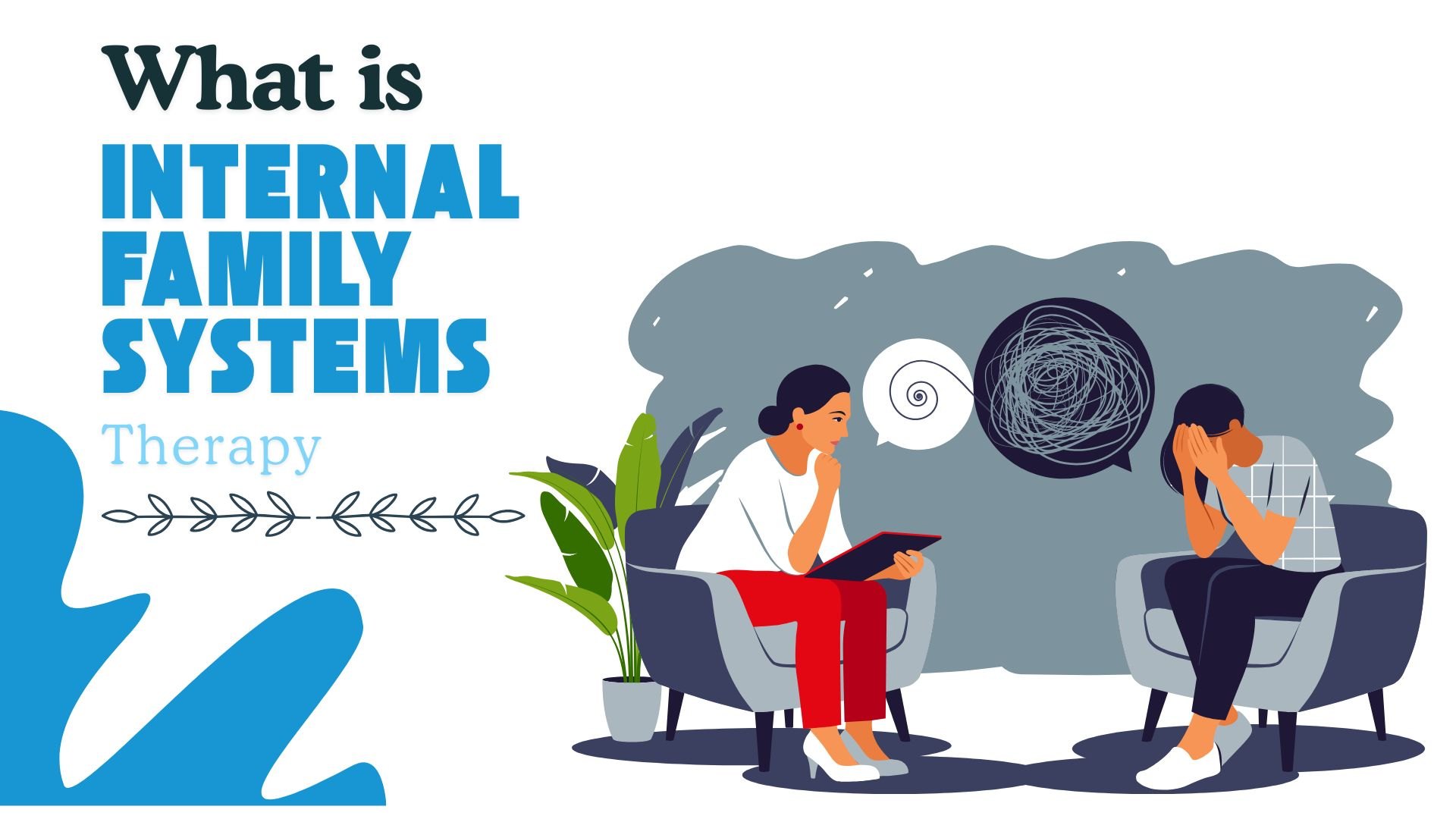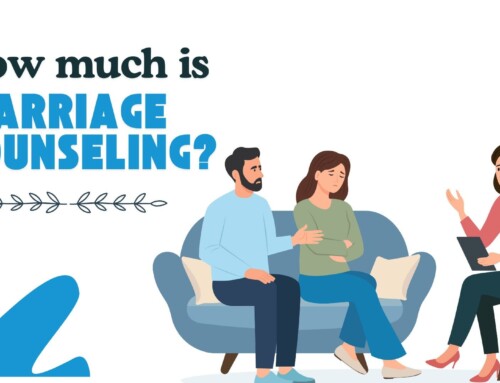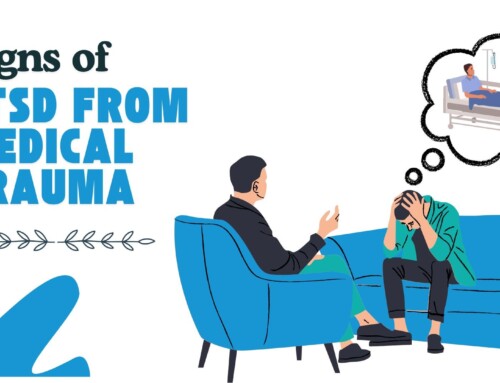What is Internal Family Systems Therapy and its Benefits?
|
TL;DR
|
|---|
Have you ever felt like different parts of you are pulling in opposite directions? One craving change while another clings to comfort? Internal Family Systems therapy offers a unique way to understand these inner conflicts by treating the mind as a “family” of distinct parts, each with its own voice, fears, and desires. Instead of suppressing these parts, IFS helps you listen to them, heal past wounds, and create inner harmony. In this blog, we’ll explore what is Family Systems therapy, how it works, and the powerful benefits it can bring to emotional well-being and self-discovery.
What is Internal Family Systems Therapy?
Internal Family Systems (IFS) Therapy is a form of psychotherapy developed by Dr. Richard Schwartz that views the mind as a system made up of different “parts” or sub-personalities. These parts often carry unique emotions, beliefs, and roles, such as the “protector,” “critic,” or “inner child.”
Instead of seeing these parts as problematic, the Internal Family Systems model recognizes them as valuable aspects of the self that have taken on extreme roles due to past experiences or trauma. At the core of IFS is the belief that every person has a compassionate and grounded “Self” that can help heal and bring balance to these parts.
How Did Internal Family Systems Therapy Originate and Develop?
The IFS Therapy has an interesting history rooted in both family therapy and a deeper understanding of the human mind. Its development was shaped by observations of how people experience their inner world as a collection of “parts.”
- Developed in the 1980s by Dr. Richard Schwartz
- While working as a family therapist, he observed that clients often described different “parts” of themselves acting like different family members.
- Instead of treating these voices as metaphors, he explored them and found they carried unique roles and emotions shaped by past experiences.
- Creation of the IFS Model
- Dr. Schwartz designed a therapeutic framework viewing the mind as an internal system of parts led by a compassionate core “Self.”
- The goal was to bring balance and healing by understanding and integrating these parts rather than suppressing them.
- Evolution and Recognition
- Over time, IFS blended systems thinking with mindfulness and self-compassion techniques.
- It became recognized as an evidence-based therapy for trauma, anxiety, and emotional healing.
- Global Adoption
- Today, IFS is used worldwide by therapists and individuals for both clinical treatment and personal growth, focusing on curiosity, understanding, and inner harmony.
What are the Key Concepts in IFS Therapy?
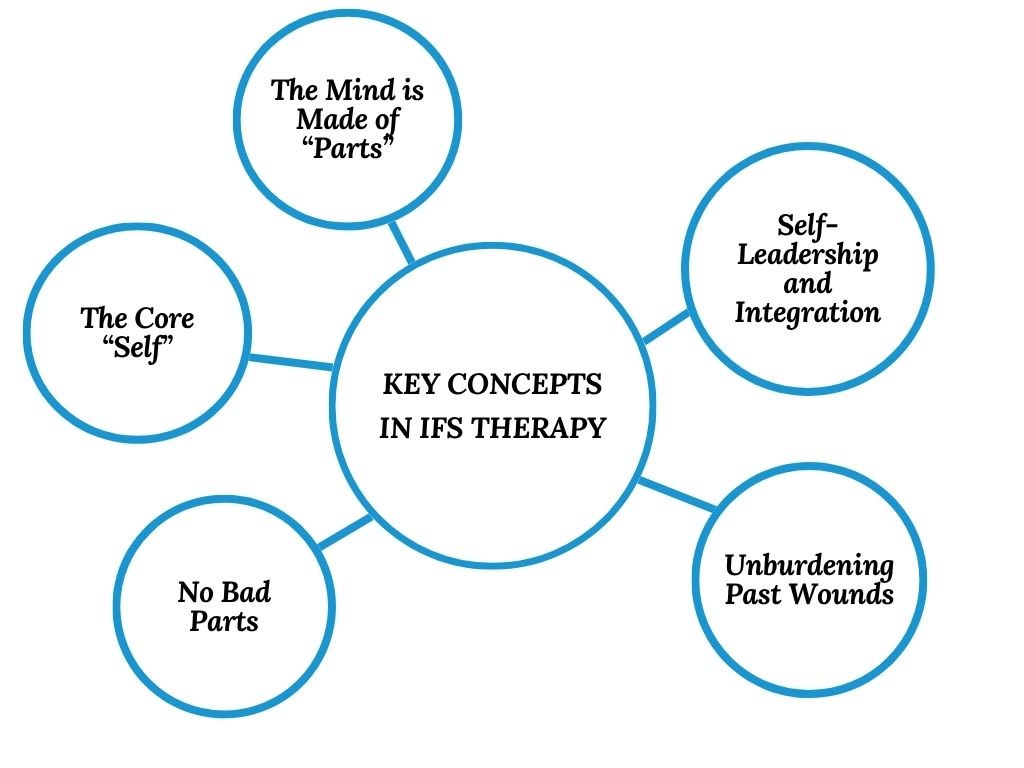
IFS Therapy is built on a set of core principles that shape how the mind and healing process are understood. Here are the key concepts:
1. The Mind is Made of “Parts”
IFS sees the psyche as an internal system of sub-personalities or “parts,” each with its own emotions, beliefs, and roles. These parts often emerge to protect us, cope with trauma, or fulfill specific needs.
2. The Core “Self”
At the center of every person is the “Self,” a calm, compassionate, and grounded state of being. The Self is not a part but the natural leader of the system, capable of guiding and healing all other parts.
3. No Bad Parts
IFS operates on the belief that all parts have positive intentions, even if their methods are harmful. Instead of trying to eliminate these parts, the goal is to understand and transform their roles into healthier ones.
4. Unburdening Past Wounds
Parts often carry “burdens,” which are painful emotions, beliefs, or memories from past experiences. IFS therapy helps release these burdens so the parts can return to their natural, balanced roles.
5. Self-Leadership and Integration
Healing in IFS comes from the “Self” connecting with and leading the “parts” with compassion. As parts learn to trust the Self, they integrate, bringing inner harmony and emotional well-being.
What are the Different Types of Parts in IFS?
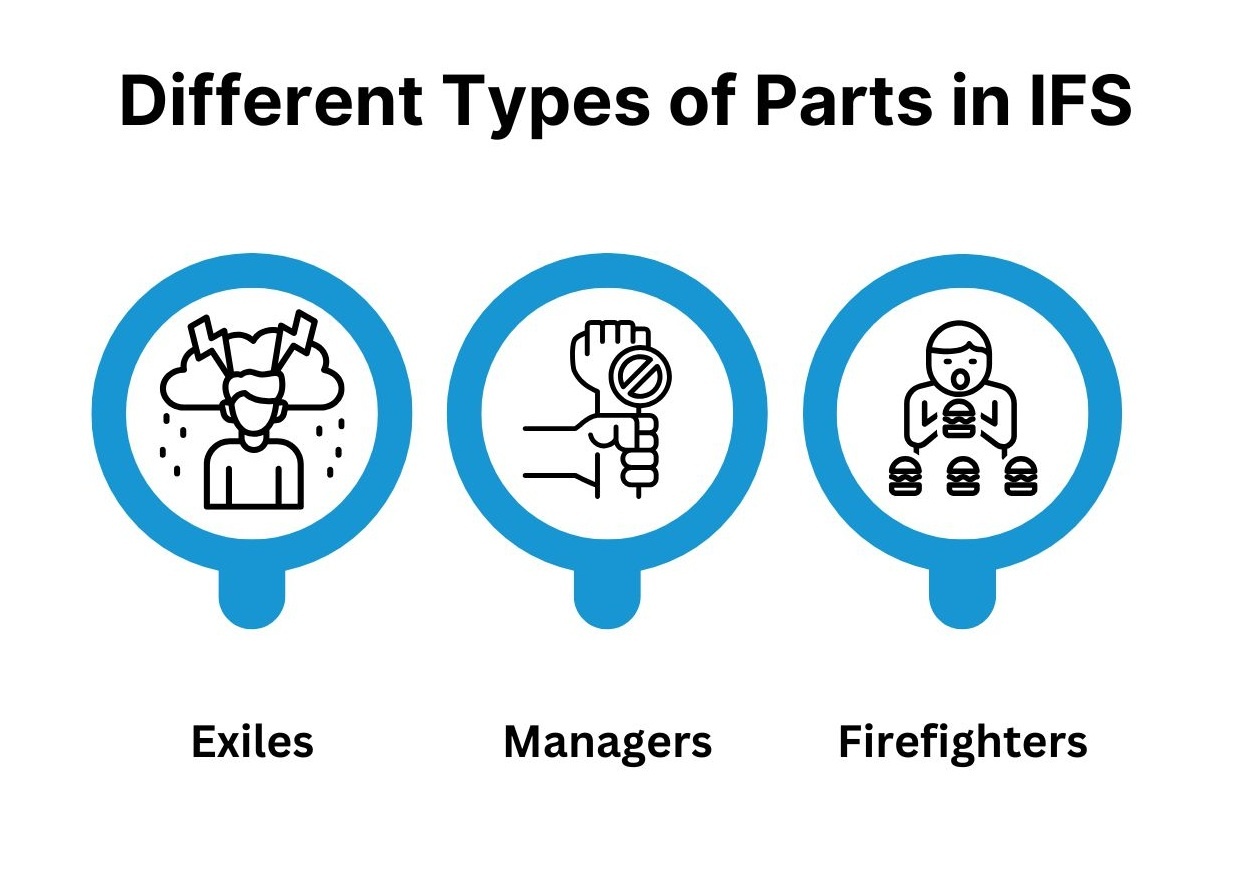
IFS Therapy categorizes the mind’s parts into specific roles based on how they function to protect and manage the system. Each type plays a unique part in shaping our emotional responses and behaviors.
1. Exiles
Exiles are the parts that carry deep wounds, painful memories, and emotions from past experiences. They are often hidden away to protect the person from feeling overwhelming hurt, shame, or fear.
2. Managers
Managers are proactive, protective parts that try to keep the system safe by preventing the exiles’ pain from surfacing. They often take on roles like being highly controlling, perfectionistic, or people-pleasing to maintain stability.
3. Firefighters
Firefighters act reactively when exiles’ emotions break through despite the managers’ efforts. They try to quickly numb or distract from the pain, often using impulsive behaviors, such as overeating, substance use, or avoidance.
How Does an IFS Therapy Session Work?
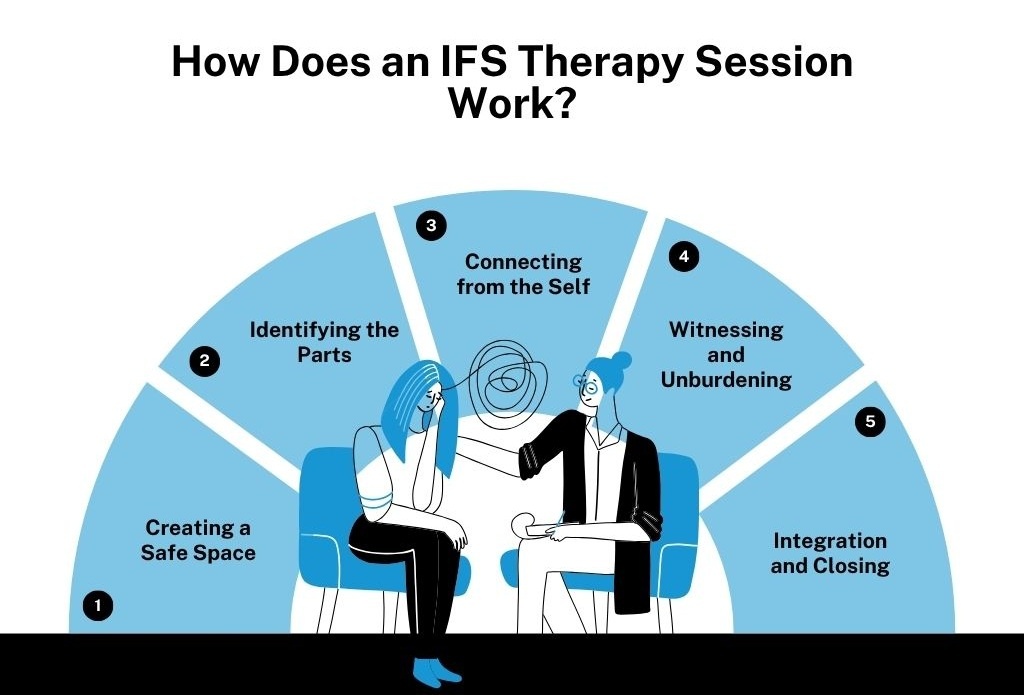
An IFS therapy session is a guided process where a trained counselor helps you explore and heal different “parts” of yourself. The session unfolds in structured steps designed to create safety, build self-awareness, and release emotional burdens. Here they are:
Step 1: Creating a Safe Space
The counselor begins by establishing a calm, supportive environment for the IFS or trauma therapy session. This may include light grounding exercises, such as deep breathing, to help you focus inward. The goal is to make you feel secure enough to explore vulnerable emotions.
At this stage, the counselor emphasizes that every part of you has value and is welcome in the session. This reassurance helps reduce self-criticism and signals to your inner system that it is safe to open up.
Step 2: Identifying the Parts
Next, the counselor gently guides you to notice what’s present, perhaps an emotion, a body sensation, or a thought. From there, you identify a “part” that’s connected to it, such as a protective manager, a reactive firefighter, or a wounded exile.
The counselor encourages curiosity about the part: What does it feel like? What role has it been playing? This process helps the part feel acknowledged instead of suppressed or judged.
Step 3: Connecting from the Self
The counselor then helps you shift into your “Self”, the calm, compassionate core of who you are. From this state, you begin to interact with the part, listening to what it needs and understanding its intentions.
Often, the part reveals it has been trying to protect you in some way. Building this trust allows the part to feel supported by the Self instead of carrying its burden alone.
Step 4: Witnessing and Unburdening
As trust deepens, the part may share painful memories or beliefs it has held. The counselor supports you in witnessing this story with empathy, which begins the healing process.
Once the part feels heard, the counselor guides you through “unburdening,” where the part releases the weight of its past role. This step helps restore balance to your internal system.
Step 5: Integration and Closing
Finally, the counselor helps you integrate the experience and check in with other parts to ensure they feel safe with the changes. This reinforces the Self as the leader of your system.
The session ends with gentle grounding to bring you back to the present. Over time, repeated sessions with the counselor create lasting inner harmony and self-leadership.
At Total Life Counseling, we understand how overwhelming it can feel when different parts of you are in constant conflict. Many people who feel stuck, disconnected, or weighed down by past wounds have found hope and healing through our TLC Therapy in Tampa. Whether you’re struggling with anxiety, unresolved trauma, or inner turmoil, we’re here to guide you toward balance and self-compassion, one step at a time.
What are the Benefits of Internal Family Systems Therapy?
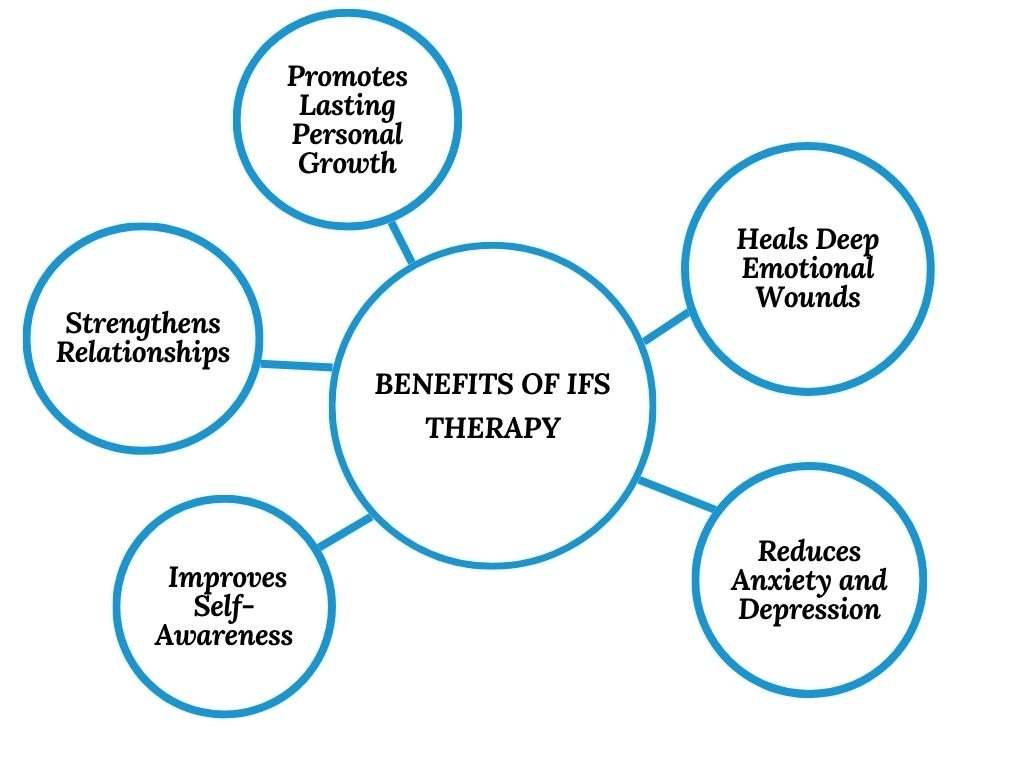
IFS Therapy offers a wide range of emotional and psychological benefits by promoting self-awareness and healing from within.
1. Heals Deep Emotional Wounds
IFS helps individuals connect with and heal parts carrying past trauma, fear, or shame. By releasing these “burdens,” people often experience profound emotional relief and freedom from long-held pain.
2. Reduces Anxiety and Depression
By creating inner harmony and understanding between parts, IFS can significantly reduce symptoms of anxiety and depression. It encourages self-compassion, which helps calm inner conflict and promotes mental well-being.
3. Improves Self-Awareness
IFS allows individuals to better understand their internal world, recognizing different parts and their roles. This heightened awareness leads to healthier emotional responses and decision-making.
4. Strengthens Relationships
When people heal their inner parts, they become more empathetic and less reactive in relationships. This improved emotional regulation helps create deeper connections with others.
5. Promotes Lasting Personal Growth
IFS doesn’t just address symptoms; it empowers individuals to build a strong connection with their core Self. This ongoing relationship builds resilience, inner peace, and long-term personal development.
Discover Inner Healing Through Internal Family Systems Therapy at Total Life Counseling
At Total Life Counseling, we believe true emotional healing begins by understanding every part of who you are. That’s why we offer TLC therapy at our Tampa practice, a powerful, evidence-based approach that helps individuals explore their inner world, heal past wounds, and create lasting balance. Whether you are struggling with anxiety, trauma, or relationship challenges, our therapy provides a gentle pathway to self-awareness and harmony.
At our Tampa office, Gemima McMahon, M.A., LMHC, brings this work to life with both warmth and structure. Combining advanced training in trauma-informed care with her experience working with children, teens, women, and couples, Gemima guides clients toward deeper healing and emotional freedom.
If you are looking for inner healing, building self-compassion, and restoring emotional balance, Gemima and the Total Life Counseling team are here to walk with you every step of the way. Schedule a free 15-minute consultation to begin your journey toward harmony and self-leadership.
Conclusion
Internal Family Systems Therapy offers a gentle yet powerful path to self-healing by helping you understand and integrate the different parts of your inner world. By creating self-compassion and reducing internal conflict, IFS creates space for emotional balance, personal growth, and lasting well-being. Whether you are working through past wounds or seeking deeper self-awareness, IFS provides a framework to reconnect with your true Self and lead your life with clarity and harmony.
Frequently Asked Questions
Is IFS therapy effective for PTSD and trauma survivors?
Yes, IFS therapy has been shown to help cut down PTSD symptoms in people who have gone through trauma. Many people say they have better control over their feelings, feel less distant from themselves, and have more compassion for themselves.
Can IFS therapy be done on my own, or do I need a therapist?
Self-reflection is helpful in IFS therapy, but working with an experienced IFS therapist gives you guided support. They help you get direct access to your inner parts in a safe way. This can help you heal and understand yourself better.
Does internal family systems therapy work?
Yes, Internal Family Systems (IFS) therapy is widely recognized as an effective, evidence-based approach for healing trauma, anxiety, and emotional conflict. It works best when guided by a professional counselor like the experienced team at Total Life Counseling.
How do I find a qualified IFS therapist in Tampa, Florida?
You can find IFS therapists in Tampa by checking directories like the Mental Health Services Administration. Look for psychologists who have IFS training or are certified family therapists, so you know they know what they’re doing. You can also look on the IFS Institute website or other online resources to get a good match for your mental health needs.
What is the difference between IFS and traditional talk therapy?
Unlike regular talk therapy, the IFS model looks at how different members of a family act out inside your mind. The main goal of therapy is to help these inner parts work together and deal with hidden feelings. This unique way lets people see beyond just talking about their problems.
How long does it typically take to see results with IFS therapy?
Results from IFS therapy can be different based on the issues that people have. Some people try it to help with addiction, bulimia, or even physical problems like rheumatoid arthritis. Many clients see good changes with just a few sessions, especially if they have one issue to work on. But when the problems are more complex and deep, it can take more time.
Filed in: Updates
Share This Story, Choose Your Platform!
Total Life Counseling Center consists of Licensed Counselors, masters level therapists, Español counselors, Licensed Mental Health Counselors, business coaches, and image enhancement coaches who provide counseling for emotional, mental, physical and spiritual care including marriage, individual, family, substance abuse and more. TLC’s family, trauma and marriage experts have been interviewed on National and Local TV/Radio over 200 times for their expert advice on Fox News, OWN, WETV, ABC’s Medical Minute and more. Our skilled counselors are relational, approachable and specialists providing therapy services in the Central Florida area including: Orlando, Winter Park, MetroWest, Windermere, Dr. Phillips, East Orlando, Lake Mary, and Clermont, Boca Raton Florida, and Dallas, TX.

